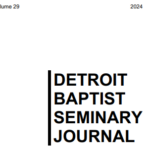Depravity, Regeneration, and Sanctification: Take Two
In the wake of the furor of my last blog post, I was heartened this week to discover a helpful post by Rick Phillips that cuts to the very heart of the question of the believer’s participation in sanctification. The post, titled Thank God that Christians Are Not Totally Depraved, addresses the primary problem with Tullian Tchividjian’s model of sanctification pursued in my earlier post, viz., that Tchividjian has not fully grasped the import of the new birth.
Tchividjian’s primary motivation (and a noble one) is to protect the ad extra nature of justification: the totally depraved unbeliever is wholly unable to help himself, and so must be justified from without himself, passively and apart from works, by grace alone through faith alone in Christ alone. Tchividjian’s theology at this point is impeccable.
The tension arises when Tchividjian expands the ad extra nature of justification to include sanctification in its scope: not only is justification not by works and all of Christ, he effectively claims, but sanctification as well. After all, one might argue, if God is most glorified when he extends justifying grace to totally depraved and passive persons (and he is), doesn’t it follow that he is likewise most glorified when he extends sanctifying grace to totally depraved and passive persons? The logic is plausible, but it suffers from an insurmountable tension: Paul answers it with a harsh “God forbid!” (Rom 6:1–2).
Paul then goes on to explain the reason for his harsh answer: the “old self was crucified with him so that the body of sin might be done away with, that we should no longer be slaves to sin” (v. 6). Or in other words, God regenerated us so that we are no longer totally depraved. Lest his point be lost, Paul repeats himself over and again: the believer has been “freed from sin” (v. 7), has become “dead to sin and alive to God in Christ” (v. 11), and is no longer “under the law [of sin and death], but under the grace [of regenerate life]” (v. 14). This new reality is such that the regenerate, Spirit-indwelt person is now able to participate in his own sanctification, pleasing God by “living a new life” (v. 4) and enslaving himself willingly to the law of Christ (v. 13).
This is the substance of sanctification—not that the believer continues passively in his depravity so that God’s grace ad extra may abound, but that the believer lives a new life and willingly subjects himself to the perfect law of liberty, contained in the Word, both hearing and doing what it says and consequently being “blessed in what he does” (Jas 1:25).
Of course the believer is not perfect—the remnants of sin still plague his Christian walk. But neither is he totally depraved. He is a new creature in Christ (2 Cor 5:17), in possession of the mind of Christ (1 Cor 2:16), and a partaker of the divine nature (2 Pet 1:4). I pursue sanctification not merely because I am thankful for what God has done for me ad extra (justification), but also because of what he has accomplished within me in regeneration.



Sorry Dr. Snoeberger, ad extra wasn’t on my scholarly, Latin phrase sheet so I admit I had to look it up.
Question: How do you take John 15:5, “For apart from me [Jesus] you can do nothing [i.e., bear fruit]” (ESV), or Philippians 2:13, “For it is God who works in you both to will and to do of his good pleasure” (ESV)? Are they weaknesses or do they bolster your argument further?
Both of those texts demonstrate well the mutual participation of God and the believer in sanctification. God is at work producing in the believer the fruits of faith and obedience, but that does not result in passivity on the part of the believer. Instead, God is working in the believer such that the believer exercises his own volition and employs his own energy to do what God wants him to do.
Thanks for bringing Phillips article to our attention and for your helpful observations also.
I wasn’t aware of Tchividjian’s depravity angle but seeing it now… it explains a lot of things–as does the corrective.